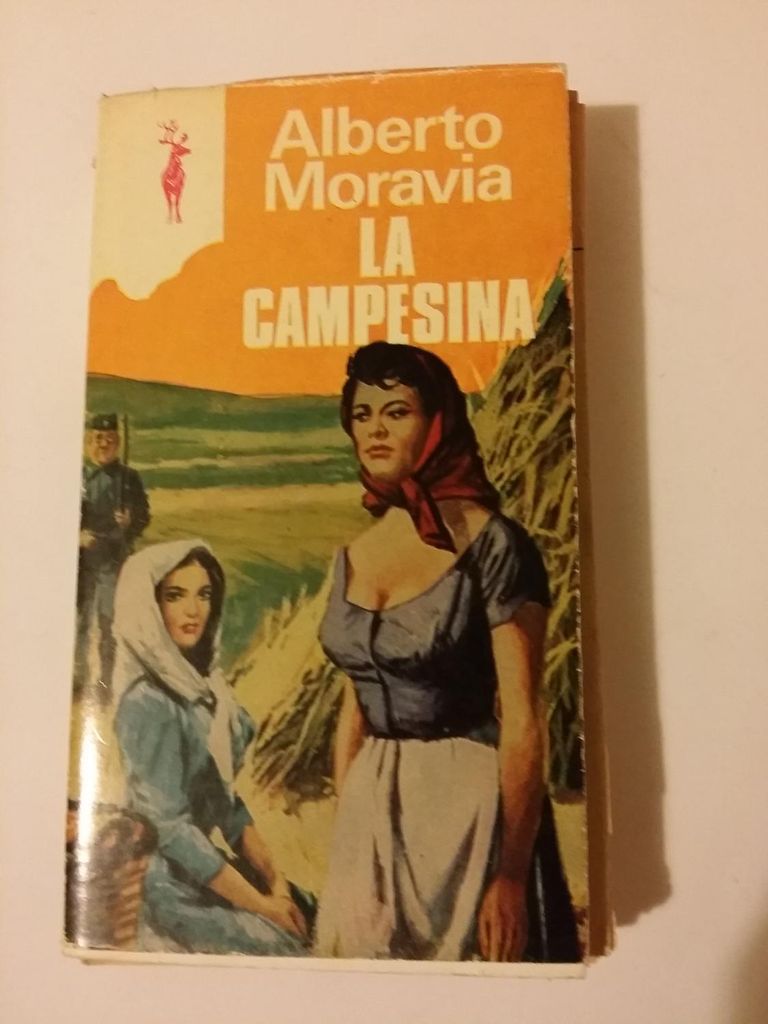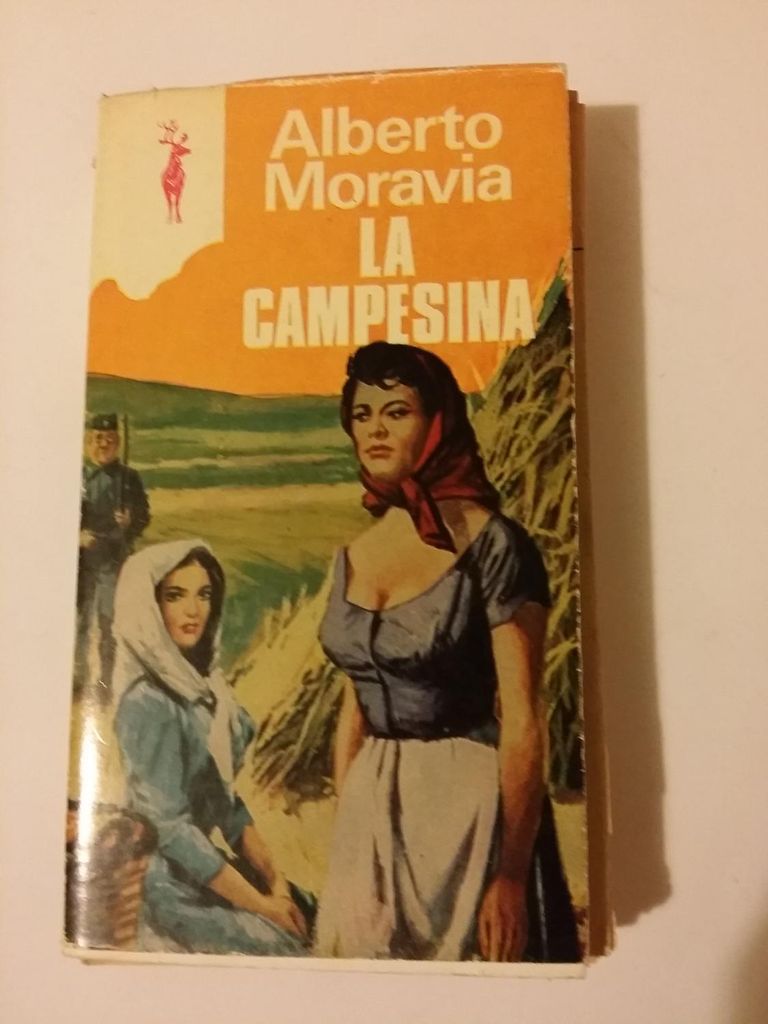
Re-reading a book after several years (usually it happens between that period that goes from our youth with few obligations and free time to devote to reading until we enter the maturity of our life cycle in which also family and other obligations decrease leaving more space for leisure and free time) involves certain risks because the actuality of our lives has changed a lot and because the structure of the society in which we live (society not country) has also changed establishing different rules of living and communicating.
Thus, suddenly, we find ourselves with worn books that we have read 20-30 years ago when nowadays the paper support is being increasingly replaced by the digital support and, in the case of books, the traditional paper book with the sturdy spine bound in hard cover or simply in soft cover and glued is giving way to the ebook.
But apart from these considerations that may seem trivial or not, to the use and consumption of the recipient, the important thing is to read.
Today I want to share with all the literary #blurtians of this Community - which was one of the first to open its doors to literature in general and especially to book reviews - one of the best known works by the Italian writer - now deceased - Alberto Moravia.
I am talking about La Campesina and here is my impression of the book, read for the second time.

Volver a leer un libro a distancia de varios años (normalmente ocurre entre ese período que va de nuestra juventud con pocas obligaciones y tiempo libre para dedicarle a la lectura hasta que entramos en la madurez de nuestro ciclo vital en la cuál también las obligaciones familiares y de otro tipo disminuyen dejando mayor espacio al ocio y al tiempo libre) implica ciertos riesgos porque la actualidad de nuestras vidas ha camabiado mucho y porque la estructura de la sociedad en la que vivimos (sociedad no país) también ha cambiado estableciendo distintas reglas de vivir y comunicar.
Así, de repente, nos encontramos con libros ajados que hemos leído 20-30 años atrás cuando en la actualidad el soporte de papel está siendo substituído cada vez más por el soporte digital y, en el caso de los libros, el tradicional libro de papel con el robusto lomo encuadernado en tapa dura o simplemente en tapa blanda y encolado está dejando paso al ebook.
Pero aparte de estas consideraciones que puede parecer triviales o no, a uso y consumo del destinatario, lo importante es leer.
Hoy quiero compartir con todos los #blurtians literarios de esta Comunidad -que fue una de las primeras en abrir sus puertas a la literatura en general y especialmente a las reseñas de libros- una de las obras más conocidas por el escritor italiano -ya fallecido- Alberto Moravia.
Estoy hablando de La Campesina y a continuación les cuento mi impresión sobre el libro, leído por segunda vez.

As in all of Alberto Moravia's novels, the characters are very few and in general the main ones are no more than two or three.
In this case the story and the plot revolve around a mother and her daughter who must escape from a convulsed Rome in the aftermath of World War II, besieged by the Allies but still in the hands of Benito Musolini's fascist regime.
The political reference is scarce and the whole development of the novel is centered on the human aspect and the misfortunes of the two women.
It should be noted that the story narrated, although it is a work of fantasy, was written "live" by Alberto Moravia, that is, as the events unfolded at the same time.
Thus, he began writing it in 1944 (when the war was in its final stages) and finished it in 1946 (when the war was already over).
Cesira, a peasant girl from the rural area of Lazio (where Rome is located) marries an older Roman merchant (it is a marriage of convenience arranged by her parents who want to take her away from the misery of rural Italian life) and moves to the Italian capital, dazzled by the Roman art and beauty she encounters at every turn.
The couple has a daughter, Rosita, a shy girl who is the source of constant care and concern on the part of her mother. Her husband dies and she is left in charge of the business when the war breaks out.
Famine, black market, and the political and social upheaval of a regime on the verge of collapse (Musolini allied with the Germans) in a predominantly male society and context make both women decide to leave Rome to join their families and then return when the Allies have occupied Rome and restored peace and tranquility.
However nothing goes as planned, the provincial roads are full of soldiers and the two find no help anywhere and when they do receive it they must pay for it with a lira that is worth less and less with each passing day.
In reality Rome is still invaded by the Nazi forces, Musolini's troops wander around without being able to restore tranquility and the only apparent solution is to take refuge in the mountains of Ciociaria, a region located southeast of Rome on the border between Lazio and Campania, historically considered a poor area of shepherds in an impoverished and wild territory, a kind of return to their homeland.
In this changing historical context, where the allied forces do not necessarily represent the good for the inhabitants, as soldiers of all nationalities and creeds converge - for example, most of the French soldiers are Africans - the two women begin to become aware of evil and wickedness, coming into contact with a world they had not perceived until then, as if they had lived in a glass bell away from a hostile and bloody outside world.
The arrival of the Anglo-Americans, who reject the Nazi advance, does not represent for both women the salvation they expected, on the contrary, their daughter Rosita is violated by a group of Moroccan soldiers under the French flag and the English and American officials they manage to contact are not too concerned about the fate of two fugitives in times of war.
This brutal ecato represents the destruction of the innocence and hope that once seemed to be within the reach of the two women.
Amidst the apathy of the humiliations and humiliations they have suffered, they return to Rome knowing that even once peace and tranquility are restored, life will never be the same again.

Como en todas las novelas de Alberto Moravia los personajes son muy pocos y en general los principales no son más de dos o tres.
En este caso la historia y la trama giran alrededor de una madre y su hija que deben escapar de una Roma convulsionada en postrimerías de la Segunda Guerra Mundial, asediada por los aliados pero en manos todavía al régimen fascista de Benito Musolini.
La referencia política es escasa y todo el desarrollo de la novela se centra en el aspecto humano y las desventuras de las dos mujeres.
Hay que tener en cuenta que la historia narrada si bien es una obra de fantasía fue escrita "en vivo" por Alberto Moravia, es decir a medida que, contemporáneamente de desarrollaban los eventos.
Así comienza a escribirla en 1944 (cuando la guerra está en su parte final) y la termina en 1946 (con la guerra ya terminada).
Cesira, una campesina de la zona rural del Lazio (donde se encuentra Roma) se casa con un comerciante romano mayor que ella (es un matrimonio por conveniencia acordado por los padres quienes quieren alejarla de la miseria de la vida rural italiana) y se traslada a la capital italiana deslumbrada por el arte y la belleza romanos que encuentra a cada paso.
El matrimonio tiene una hija Rosita, tímida que es fuente de continuos desvelos y cuidados por parte de su madre. El marido fallece y queda ella a cargo del negocio cuando estalla la guerra.
Carestía, mercado negro, y convulsión política y social de un régimen a punto de sucumbir (Musolini aliado de los alemanes) en una sociedad y en un contexto predominantemente masculinos hacen que ambas mujeres tomen la decisión de alejarse de Roma para reunirse con sus familiares y luego volver cuando los aliados hayan ocupado Roma y restablecido la paz y la tranquilidad.
Sin embargo nada sale como previsto, las rutas provinciales están llenas de soldados y ambas no encuentran ayuda en ningún lado y cuando la reciben deben pagar con ello con una lira que cada dia que pasa vale menos.
En realidad Roma sigue invadida por las fuerzas nazis, las tropas de Musolini deambulan sin logar restablecer la tranquilidad y la única solución aparente es refugiarse en las montañas de Ciociaria, una región situada al sureste de Roma en el confín entre Lacio y Campania históricamente considerada una zona pobre y de pastores dentro de un territorio empobrecido y salvaje, una especie de retorno a su tierra natal.
En este contexto histórico tan cambiante, donde las fuerzas aliadas no representan necesariamente el bien para los pobladores ya que confluyen soldados de todas las nacionalidades y credos -por ejemplo la mayor parte de los soldados frances son africanos- las dos mujeres comienzan a darse cuenta del mal y la maldad, entrando en contacto con un mundo que no habían percibido hasta entonces, es como si hasta ese momento hubieran vivido en una campana de cristal alejadas de un mundo exterior hostil y cruento.
La llegada de los angloamericanos, que rechazan la avanzada nazista no representa para ambas mujeres la salvación que se esperaban, al contrario la hija Rosita es violentada por un grupo de soldados marroquís arrolados bajo la bandera francesa y los funcionarios ingleses y norteamericanos que logran contactar no se preocupan demasiado por la suerte de dos prófugas en tiempos de guerra.
Esta ecato brutal representa la destrucción de la inocencia y la esperanza que en un momento parecía estar al alcance de la mano de las dos mujeres.
Entre la apatía por las vejaciones y humillaciones que han sufrido vuelven a Roma sabiendo que aún una vez restablecida la paz y la tranquilidad, la vida nunca más volverá a ser como antes.

Moravia's novel is a true literary allegory. For those who do not know the origin of the novel it is fair to say that the battalions of Moroccan soldiers formed by President De Gaulle to fight alongside the Allies in the Second World War, committing many brutal acts throughout Italy but especially in the area of Ciociaria where the plot of the novel is set, against women, but also against children and men, bestial violence and assaults which the Allied and French troops preferred to ignore and not denounce, implicitly accepting a modern theory of the ancient right to siege.
The underlying theme throughout the novel La Campesina is that of violence, not only the violence of war, justified by an alleged and rarely specified right to defend the interests of the population from an enemy that oppresses it, but more generally violence in the broadest sense, which ends up invading all spheres, no longer distinguishing between good and evil between oppressed and oppressors.

La novela de Moravia es un verdadero alegato literario. Para aquellos que desconozcan el origen de la noevla es justo decir que los batallones de soldados marroquíes formados por el presidente De Gaulle para combatir junto a los aliados en la SegundAa Guerra Mundial, cometiendo muchos actos brutales en toda Italia pero especialmente en la zona de Ciociaria donde se sitúa la trama de la novela, contra mujeres, pero también contra niños y hombres, violencia bestial y asaltos a los cuáles las tropas aliadas y francesas prefirieron ignorar y no denunciar, aceptando implícitamente una moderna teoría del antiguo derecho al squeo.
El tema subyacente en todo momento en la novela La Campesina es el de la violencia, no solo la violencia de la guerra, justificada por un presunto y raramente precisado derecho a defender los intereses de la población de un enemigo que la oprime, pero más generalmente la violencia en el sentido más amplio, que acaba invadiendo todas las esferas, sin distinguir ya entre el bien y el mal entre oprimidos y opresores.

Alberto Moravia (actually it was a kind of pseudonym because his real name was Alberto Pincherle and Moravia was his mother's surname) was an Italian writer, journalist, screenwriter, essayist, playwright, poet, film critic and politician (he was a deputy for the Italian Communist Party) and declared atheist, is considered one of the most important novelists of the twentieth century, exploring in his works the themes of sexuality, social alienation, existentialism with a special bias towards the female universe.

Alberto Moravia (es realidad era una especie de pseudónimo porque su verdadero nombre era Alberto Pincherle y Moravia era el apellido materno) fue un escritor, periodista, guionista, ensayista, dramaturgo, poeta, crítico de cine y político italiano (fue diputado por el partido comunista italiano) y declarado ateo, es considerado uno de los novelistas más importantes del siglo XX, explorando en sus obras los temas de la sexualidad, la alienación social, el existencialismo con una especial predisposición hacia el universo femenino.

The novel was published in 1957 (eleven years after Moravia finished writing it) because the author was persecuted and had to go into hiding for a while due to his communist affiliation.
Three years later it was taken to the big screen in the film of the same name (in Spanish was released under the name Two Women.)directed by Vittorio De Sica and starring a dazzling Sophia Loren accompanied in the male role by Jean-Paul Belmondo.
The success of the film meant that in subsequent editions of the novel the face of the famous Italian actress appeared on the cover, identifying herself with the main protagonist in the minds of readers who still remember her today.

La novela fue publicada en el año 1957 (once años después que Moravia terminara de escribirla) ya que el autor fue perseguido y se debió esconder por un tiempo por su filiación comunista.
Tres años más tarde fue llevada a la gran pantalla en la película homónima (en español se estrenó con el nombre de Dos Mujeres)dirigida por Vittorio De Sica con la actuación de una deslumbrante Sophia Loren acompañada en el rol masculino por Jean-Paul Belmondo.
El suceso de la película hizo que en las posteriores ediciones de la novela apareciera en la tapa la cara de la famosa actriz italiana identificándose con la protagonista principal en la mente de los lectores que aún hoy la recuerdan.

Telegramand Whatsapp
Thanks @blurtconnect-ng.
Upvoted. Thank You for sending some of your rewards to @null. Read my last posts to make sure that BLURT burning is profitable for you. Before using this bot please make sure your account has at least 100 BP. Get more BLURT:
@ mariuszkarowski/how-to-get-automatic-upvote-from-my-accounts@ blurtbooster/blurt-booster-introduction-rules-and-guidelines-1699999662965@ nalexadre/blurt-nexus-creating-an-affiliate-account-1700008765859@ kryptodenno - win BLURT POWER delegation@ ctime/burn-bot-liquid-blurtThanks!
Hi @testarasta, great news! Your content was selected by curators @ten-years-before, @nalexadre to receive a special curation from BeBlurt 🎉 Don't hesitate to upvote this comment as the curators will receive 80% of the rewards for their involvement.
You can support us by voting for our witness, our decentralized funding proposal, or through delegation. You're also welcome to join our Discord server 👉 https://discord.beblurt.com
Thank you for curating and voting for my content @beblurt.